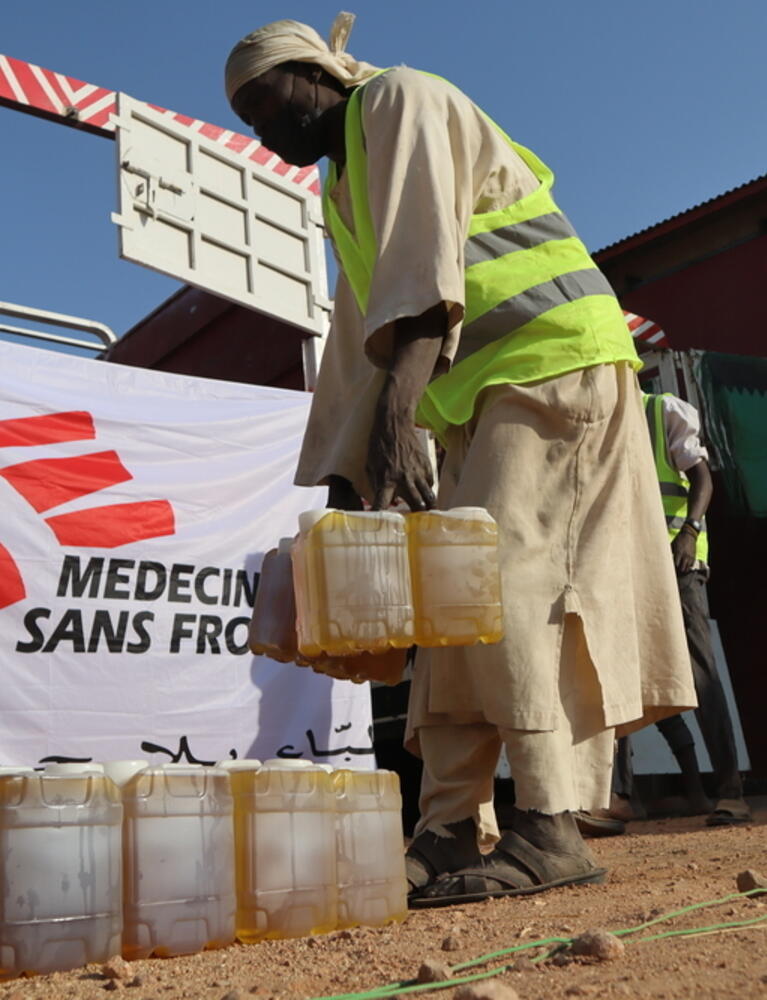The ongoing conflict in Sudan has not only devastated health structures but has also severely compromised food security, leaving millions in danger, particularly in conflict-affected areas such as South Darfur. Among those enduring the most of this crisis are internally displaced persons (IDPs), many of whom are struggling to secure even the most basic necessities, including food.
Children under five years old, as well as pregnant and breastfeeding mothers are among the most vulnerable groups affected by this worsening malnutrition crisis. In 2024, over 7200 children under five years old and pregnant and breastfeeding women from Nyala and surrounding areas were admitted into MSF outpatient feeding programs with severe malnutrition. With limited access to nutritious food, these groups face heightened risks of severe acute malnutrition (SAM), which, if left untreated, is life-threatening.
Limited Humanitarian Presence, Increased Needs
The scarcity of humanitarian activities run by UN agencies and the lack of a humanitarian response commensurate with the needs imposes challenges on efforts to address the food situation and the overall crisis in South Darfur and across Sudan. This reality means limited resources, resulting in continued gaps in life-saving services, especially the treatment of malnutrition. MSF had already initiated emergency nutritional support in some of the most affected areas, but under the current circumstances, our teams are facing considerable pressure to expand and sustain these efforts.
A Nutrition Response Under Pressure
In December, MSF began distributing food parcels to families of children and families of pregnant and breastfeeding women enrolled in our malnutrition treatment programmes. The aim was to offer some short-term relief to those facing the harshest consequences of food insecurity, particularly as the economic situation continues to deteriorate. In South Darfur, communities have been exposed to extreme levels of violence. Many have been displaced—with women in particular often left to care for large families on their own, cut off from income and support networks. With few options available, people struggle to meet their most basic needs.
In order to reduce instances where the child's therapeutic food is divided amongst the hungry relatives, we provide a family ration for a duration of two months,” says Hunter McGovern, MSF’s Targeted Food Distribution Project Coordinator in South Darfur. “This allows the child to receive the full course of their nutrition therapy while increasing the nutritional situation of the whole family. Even with this activity in progress, the needs remain overwhelming."
MSF’s response provides food rations amounting to 2000 calories per day per person for families, at an average of five persons per family, to cover a period of two months. This programme helps give the whole family the food they need, which in turn supports the treatment of malnourished children towards a healthy weight.
"During our distributions, we found that the average family size is much larger than what we had initially planned for—sometimes as many as ten people per household. This underscores just how critical the food shortage is and how much more assistance is required to meet the real needs of the population." Hunter McGovern said. People travel when they hear a relatives' family has received food assistance, underscoring the critical nutrition shortage on ground.
The Need for a Stronger Humanitarian Response
MSF remains committed to addressing the urgent nutritional needs of populations affected by the conflict in South Darfur. The scale of the crisis far exceeds the capacities of the limited numbers of organizations responding to the malnutrition crisis. We are fast approaching the rainy season and the hunger gap, the time of the year when it is most difficult for people in South Darfur to access food and when it is most difficult for humanitarian supplies to reach the state. Supplies for the treatment of malnutrition, and for food distribution programmes, have to be pre-positioned now before communities are cut off. Local responders need funding and support to continue and expand food distribution programmes for their communities. Running food distributions and expanding inpatient and outpatient therapeutic feeding programmes in South Darfur is challenging but possible - and can help prevent needless suffering and mortality.
With food security deteriorating and malnutrition rates rising, urgent action is needed to scale up humanitarian assistance and ensure that children and families receive the support they desperately need. Without a concerted effort, the crisis will only deepen, putting countless lives at risk.



